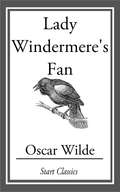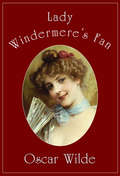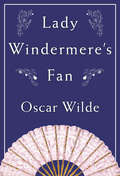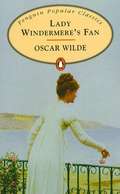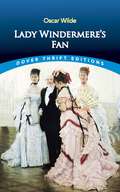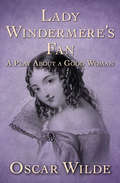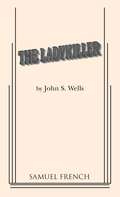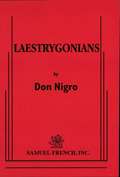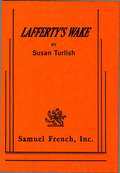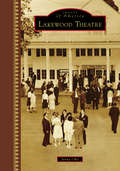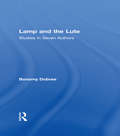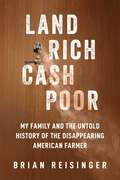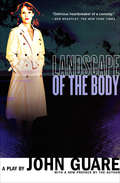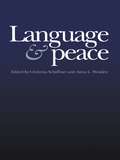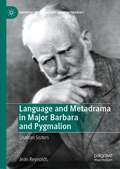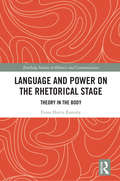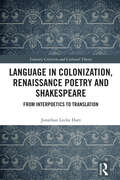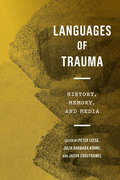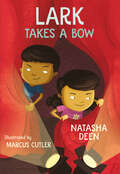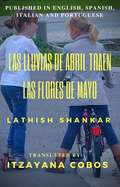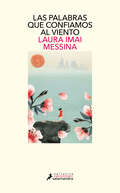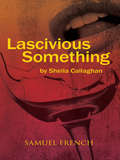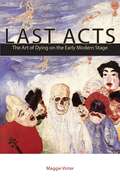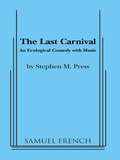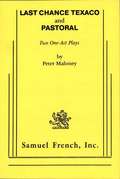- Table View
- List View
Lady Windermere's Fan
by Oscar WildeBeautiful, aristocratic, an adored wife and young mother, Lady Windermere is 'a fascinating puritan' whose severe moral code leads her to the brink of social suicide. The only one who can save her is the mysterious Mrs Erlynne whose scandalous relationship with Lord Windermere has prompted her fatal impulse. And Mrs Erlynne has a secret - a secret Lady Windermere must never know if she is to retain her peace of mind.
Lady Windermere's Fan
by Oscar WildeOscar Wilde's satiric comedy was first staged in London in 1892. Lady Windermere grows suspicious of her husband's interest in Mrs. Erlynne but the truth of the matter is not as it appears.
Lady Windermere's Fan
by Oscar WildeOscar Wilde's satiric comedy was first staged in London in 1892. Lady Windermere grows suspicious of her husband's interest in Mrs. Erlynne but the truth of the matter is not as it appears.
Lady Windermere's Fan
by Oscar WildeBeautiful, aristocratic, an adored wife and young mother, Lady Windermere is 'a fascinating puritan' whose severe moral code leads her to the brink of social suicide. The only one who can save her is the mysterious Mrs Erlynne whose scandalous relationship with Lord Windermere has prompted her fatal impulse. And Mrs Erlynne has a secret - a secret Lady windermere must never know if she is to retain her peace of mind.
Lady Windermere's Fan (Dover Thrift Editions: Plays)
by Oscar WildeClever dialogue, fast-paced repartee, and pithy epigrams abound in this sparkling Victorian comedy of manners. The first of Oscar Wilde's dramas, the 1892 play attests to the author's legendary reputation as a wit and keen observer of ironic situations. In Lady Windermere's Fan, Wilde offers a splendidly satirical view of society's obsessive regard for appearances rather than reality.A paragon of morality, Lady Windermere firmly rejects the company of anyone exhibiting even the slightest deviation from the social code. Suspecting her husband of a dalliance with Mrs. Erlynne, a woman of dubious reputation, Lady Windermere rashly decides to abandon her secure position for the seductive charms of Lord Darlington. The voice of caution arises from an unexpected source when the mysterious Mrs. Erlynne reveals the calamitous effects of her own disregard for duty and virtue, and she augments her advice with an act of self-sacrifice. By laying claim to Lady Windermere's telltale fan, the woman from outside society shows the model of social propriety the difference between true morality and its semblance.More than a century after the play's debut, the luster of its humorous quips, merry bon mots, and thought-provoking paradoxes remains undimmed. This modestly priced edition of Wilde's scintillating comic masterpiece will delight lovers of drama and literature.
Lady Windermere's Fan: A Play About a Good Woman
by Oscar WildeThe classic satirical play of gossip gone horribly and hilariously wrong from a master dramatist. &“My own business always bores me to death; I prefer other people&’s.&” Lady Windermere has a happy marriage—or she believes she does, until one of London society&’s gossips, the Duchess of Berwick, arrives with her daughter to voice her suspicions about an affair Lord Windermere appears to be having. And the duchess&’s testimony is not the only evidence either. Lord Windermere&’s private bank book shows that he has been giving large—and frequent—sums of money to a &“Mrs. Erlynne,&” and he even admits to seeing much of the woman. To add insult to injury, Lord Windermere insists that Mrs. Erlynne be invited to the ball being held for Lady Windermere&’s birthday. Employing the witty dialogue, social satire, and outrageous paradox for which he is still remembered today, Oscar Wilde&’s classic play shines a light on the destructiveness of gossip and superficial judgment. Lady Windermere&’s Fan examines the ambiguous sexual morality and gender politics at the heart of the British ruling class, while simultaneously challenging our perceptions of what constitutes a &“good woman.&” This ebook has been professionally proofread to ensure accuracy and readability on all devices.
Ladykiller
by John S. WellsWhen Jerry's wife switches them to a vegetarian diet, he snaps and becomes a serial killer of tofu eating women. Jeremy's spree ends when his seventeenth victim is electrocuted with his wife in his bathtub. A new age psychic, octogenarian twins, a redneck mechanic, a ninja and a bull mastiff join forces to bring him to justice. Fun abounds in this tour de force that is perfect for competitions.
Laestrygonians
by Don NigroFull length, drama / 3m, 3f / Unit set / Silent film starlet Mary Margaret is alone in her Hollywood bungalow, about to kill herself. A former Shakespearean stage actor, now a drunken silent movie leading man with a bad reputation, calls on her and tries to convince her to face life. In the course of their hilarious conflict, images of the actor's past emerge. His efforts to help Mary Margaret live force him to deal with his own demons and find a way to cope with the terrible secret that eats away at him like the cannibal Laestrygonians in Homer's Odyssey. Funny and rich in character and language, this powerful and unusual love story, part of the Pendragon series of plays see page73, is rich with great audition monologues and scenes. Don Nigro's followers will recognize some of the characters from Chronicles, Anima Mundi, Beast with Two Backs, Autumn Leaves and Dramatis Personae--all plays from is series Pendragon Plays.
Lafferty's Wake
by Susan TurlishAudience participation comedy with music / 4m, 3f / Interior / Our darlin' wild rover Charlie Lafferty is being waked in grand style in his home away from home, the local pub. The audience joins Charlie's widow, his sweet daughter and bumbling son in law, the parish priest and the savvy innkeeper as they celebrate the life and times of ramblin', gamblin' Lafferty. Two hours of sheer fun replete with jokes, jigs, stories and songs including such old favorites as "Molly Malone," "Whiskey in the Jar" and "When Irish Eyes Are Smiling" guarantee a festive, audience pleasing frolic.
Lakewood Theatre (Images of America)
by Jenny ObyBeginning as a humble vaudeville hall in the Skowhegan-Madison trolley park, Lakewood Theatre has graced the southwestern shore of Lake Wesserunsett in Madison, Maine, since the turn of the 20th century. Under the masterful guidance of Herbert L. Swett, a Bangor native and Bowdoin graduate, Lakewood eventually developed into a nationally renowned playhouse that was called the “Broadway in Maine” by the New York Times in its heyday, from 1925 until World War II. In the years following the war, Lakewood was operated by Swett’s heirs and became a virtual who’s who of both Broadway and Hollywood, until it nearly went dark in the early 1980s. Operating today as a nonprofit community theater, Lakewood is the official state theater of Maine and the oldest continually running summer theater in the country.
Lamp and the Lute: Studies in Seven Authors
by Bonamy DobreeFirst Published in 1964. Routledge is an imprint of Taylor & Francis, an informa company.
Land Rich, Cash Poor: My Family's Hope and the Untold History of the Disappearing American Farmer
by Brian ReisingerThe hidden history of an economic and cultural crisis that is threatening our very food supply—the disappearance of the American farmer. Taking on this working-class story of heart and hardship, award-winning writer Brian Reisinger weaves forgotten eras of American history with his own family&’s four-generation fight for survival in Midwestern farm country. Readers learn the truth about America&’s most detrimental and unexplained socioeconomic crisis: How the family farms that feed us went from cutting a middle-class path through the Great Depression to barely making ends meet in modern America. Along the way, they&’ll see what it truly takes to feed our country: accidents that can kill or maim; weather that blesses or threatens; resilience in the face of crushing economic crises, from depressions and recessions to COVID-19; and the tradition that presses down on each generation when you're not just fighting for your job, you're fighting for your heritage. With newly analyzed data, sharp historical analysis, conversations with some of modern farming&’s most notable champions and critics alike, honest debate, and personal storytelling, Reisinger reveals how the hollowing out of rural America is affecting every single American dinner table. Food prices soaring far beyond the rate of inflation, a vulnerable food supply chain, environmental and ecological dilemmas, the security of our farmland from foreign adversaries, a mental health crisis that includes farmer suicides and addictions, a deepening urban-rural divide, and more worries than ever about what&’s for dinner. These are all becoming the hallmarks of a food system that has long stood as a modern miracle. Land Rich, Cash Poor offers the honest truth about these issues, and a candid look at what we can do about them—before it&’s too late.
Landscape of the Body: A Play (Books That Changed the World)
by John GuareDeath, desire, and tabloid sensationalism converge in “this delirious heartbreaker of a comedy” by the Tony Award-winning playwright (Ben Brantley, The New York Times).Along with Six Degrees of Separation and The House of Blue Leaves, Landscape of the Body is one of John Guare’s most celebrated plays. It tells the story of a woman’s unfulfilled life and premature death—and her reflections from the grave. Betty Yearn first came to New York City to convince her sister Rosalie to leave the gritty urban world behind and come home to bucolic Maine. But when Rosalie dies in a freak bicycle accident, Betty returns to ease into her sister’s previous persona—moving into her apartment, even taking over her job—as Rosalie watches from the beyond. Then Betty’s fortunes take a jarring turn. After losing her teenage son to murder, she finds herself the primary suspect in the crime. After all, death does seem to have a way of following in her trail. In what Michael Kuchwara of the Associated Press called “his most surreal and haunting play,” John Guare brilliantly moves back and forth in time and space to create an affecting study of the American dream gone awry.
Language & Peace (War And Peace Ser. #Vol. 6)
by Christina Schäffne Anita L. WendenFirst published in 1999. Routledge is an imprint of Taylor & Francis, an informa company.
Language and Metadrama in Major Barbara and Pygmalion: Shavian Sisters (Bernard Shaw and His Contemporaries)
by Jean ReynoldsThis book focuses on two important topics in Shaw’s Major Barbara and Pygmalion that have received little attention from critics: language and metadrama. If we look beyond the social, political, and economic issues that Shaw explored in these two plays, we discover that the stories of the two “Shavian sisters”— Barbara Undershaft and Eliza Doolittle—are deeply concerned with performance and what Jacques Derrida calls “the problem of language.” Nearly every character in Major Barbara produces, directs, or acts in at least one miniature play. In Pygmalion, Henry Higgins is Eliza’s acting coach and phonetics teacher, as well as the star of an impromptu, open-air phonetics show. The language content in these two plays is just as intriguing. Did Eliza Doolittle have to learn Standard English to become a complete human being? Should we worry about the bad grammar we hear at Barbara Undershaft’s Salvation Army shelter? Is English losing its precision and purity? Meanwhile, in the background, Shaw keeps reminding us that language and theatre are always present in our everyday lives—sometimes serving as stabilizing forces, and sometimes working to undo them.
Language and Power on the Rhetorical Stage: Theory in the Body (Routledge Studies in Rhetoric and Communication)
by Fiona Harris RamsbyThrough a fusion of narrative and analysis, Language and Power on the Rhetorical Stage examines how theater can enact critical discourse analysis and how micro-instances of iniquitous language use have been politically and historically reiterated to oppress and deny equal rights to marginalized groups of people. Drawing from Aristophanes’ rhetorical plays as a template for rhetoric in action, the author poses the stage as a rhetorical site whereby we can observe, see, and feel 20th-century rhetorical theories of the body. Using critical discourse analysis and Judith Butler’s theories of the performative body as a methodological and analytical lens, the book explores how a handful of American plays in the latter part of the 20th century—the works of Tony Kushner, Suzan Lori-Parks, and John Cameron Mitchell, among others— use rhetoric in order to perform and challenge marginalizing language about groups that are not offered center stage in public and political spheres. This innovative study initiates a conversation long overdue between scholars in rhetorical and performance studies; as such, it will be essential reading for academic researchers and graduate students in the areas of rhetorical studies, performance studies, theater studies, and critical discourse analysis.
Language in Colonization, Renaissance Poetry and Shakespeare: From Interpoetics to Translation (Literary Criticism and Cultural Theory)
by Jonathan Locke HartLanguage is the central concern of this book. Colonization, poetry and Shakespeare – and the Renaissance itself – provide the examples. I concentrate on text in context, close reading, interpretation, interpoetics and translation with particular instances and works, examining matters of interpoetics in Renaissance poetry and prose, including epic, and the Hugo translation of Shakespeare in France and trying to bring together analysis that shows how important language is in the age of European expansion and in the Renaissance. I provide close analysis of aspects of colonization, front matter (paratext) in poetry and prose, and Shakespeare that deserve more attention. The main themes and objectives of this book are an exploration of language in European colonial texts of the “New World,” paratexts or front matter, Renaissance poetry and Shakespeare through close reading, including interpoetics (liminality), translation and key words.
Languages of Trauma: History, Memory, and Media (G - Reference,information And Interdisciplinary Subjects Ser.)
by Peter Leese Jason Crouthamel Julia Barbara KöhneThis volume traces the distinct cultural languages in which individual and collective forms of trauma are expressed in diverse variations, including oral and written narratives, literature, comic strips, photography, theatre, and cinematic images. The central argument is that traumatic memories are frequently beyond the sphere of medical, legal, or state intervention. To address these different, often intertwined modes of language, the contributors provide a variety of disciplinary approaches to foster innovative debates and provoke new insights. Prevailing definitions of trauma can best be understood according to the cultural and historical conditions within which they exist. Languages of Trauma explores what this means in practice by scrutinizing varied historical moments from the First World War onwards and particular cultural contexts from across Europe, the United States, Asia, and Africa – striving to help decolonize the traditional Western-centred history of trauma, dissolving it into multifaceted transnational histories of trauma cultures.
Lark Takes a Bow (Orca Echoes #3)
by Natasha DeenMysteries seem to follow Lark and Connor Ba wherever they go, and today is no exception! The part-time detectives head to their local community theater to rehearse the play they are in, only to discover that someone is playing pranks on the theater company. The twin sleuths need to work quickly to catch the culprit before one more prank closes down the play for good. It's showtime, Lark and Connor! Lark Takes a Bow is the third title in the Lark Ba Detective series. The epub edition of this title is fully accessible.
Las lluvias de abril traen las flores de mayo
by Lathish Shankar Itzayana CobosEntradas del diario de Ashitha, una niña de 10 años escritas en jerga india. La historia nos cuenta acerca de bromas infantiles, juegos, amor, afecto y el tiempo que pasó durante las vacaciones de verano con sus amigos.
Las palabras que confiamos al viento
by Laura Imai MessinaUna novela sobre el duelo y la alegría de vivir que se ha convertido en un fenómeno internacional. Cuando Yui, una joven de treinta años, pierde a su madre y a su hija de tres años en un tsunami, empieza a medir el paso del tiempo a partir de entonces: todo gira alrededor del 11 de marzo de 2011, cuando la ola gigantesca devastó Japón y el dolor se apoderó de ella. Un día oye hablar de un hombre que tiene una cabina de teléfono abandonada en su jardín, adonde las personas acuden desde todos los rincones de Japón para hablar con quienes ya no están y hallar la paz en el duelo. Pronto, Yui emprende su propio peregrinaje hasta allí, pero al levantar el auricular no encuentra las fuerzas para pronunciar una sola palabra. Entonces conoce a Takeshi, un médico cuya hija de cuatro años ha dejado de hablar tras la muerte de su madre, y su vida da un vuelco. La crítica ha dicho:«Un impactante haiku sobre el corazón humano.»The Times «Esta novela posee una fuerza muy sutil. [...] Leerla es como un bálsamo para el alma. [...] Uno de los libros del año.»Waterstones «Un libro bellísimo y muy oportuno, que nos cuenta las consecuencias que quedan de un desastre humanitario mucho después del desastre.»Bookbag «Una lectura imprescindible, un texto precioso.»Kirkus Reviews «Con su estilo sobrio y poético, este precioso libro es una íntima historia de amor y, al tiempo, una expansiva meditación sobre la pérdida y el duelo.»Heat «Un libro para leer hoy.»Cosmopolitan (UK) «Esta historia, contada con sumo cuidado, resulta particularmente oportuna en nuestros días.»Stylist «Absolutamente impactante; te deja sin aliento.»Christy Lefteri «Laura es experta en hurgar en los bolsillos secretos de Japón. Esta vez ha encontrado un teléfono y algo de viento, y con ello ha creado una obra maestra. Es, sin duda, mi nueva escritora preferida.»Orsola Branzi (La Pina) «El espacio que separa el mundo de los vivos del de los muertos, es, a menudo, muy sutil. Y Laura Imai Messina parece conocerlo a la perfección.»Romana Petri
Lascivious Something
by Sheila CallaghanCharacters: 1 male, 3 femaleSingle Set On a secluded Greek island, an American ex-pat pursues his passions: winemaking and his breathtaking young wife. Then, on the eve of Reagan's inauguration, the first tasting of the new wine is interrupted by the unexpected arrival of August's former lover. Inspired by Greek tragedy, Lascivious Something combines evocative language with sympathetic yet deeply flawed characters straight out of Euripides. "Definitely worth spending an undeniably tense evening with, right through an unexpected twist at the end." -Associated Press "Sheila Callaghan has created a great premise and fascinating characters, her writing intertwining wine and blood and sex as painful but necessary life forces." - Back Stage "Sometimes dreamlike, often shocking, Lascivious Something is at once both fraught and languorous, its most powerful moments found in the quietest revelations or silent stares. Go with an open mind and you are certain to find that your cup runneth over with ideas by the final bow." - The Collective Magazine "Callaghan, whose previous work might be described as post-feminist punk incursions into the poetic turf of early Sam Shepard, here employs a more linear narrative line to push her personal-is-political agenda." - LA Weekly "Blown Away...Honest, captivating from beginning to end. I can't recommend it enough" -CBS News
Last Acts: The Art of Dying on the Early Modern Stage
by Maggie VinterLast Acts argues that the Elizabethan and Jacobean theater offered playwrights, actors, and audiences important opportunities to practice arts of dying. Psychoanalytic and new historicist scholars have exhaustively documented the methods that early modern dramatic texts and performances use to memorialize the dead, at times even asserting that theater itself constitutes a form of mourning. But early modern plays also engage with devotional traditions that understand death less as an occasion for suffering or grief than as an action to be performed, well or badly.Active deaths belie narratives of helplessness and loss through which mortality is too often read and instead suggest how marginalized and constrained subjects might participate in the political, social, and economic management of life. Some early modern strategies for dying resonate with descriptions of politicized biological life in the recent work of Giorgio Agamben and Roberto Esposito, or with ecclesiastical forms. Yet the art of dying is not solely a discipline imposed upon recalcitrant subjects. Since it offers suffering individuals a way to enact their deaths on their own terms, it discloses both political and dramatic action in their most minimal manifestations. Rather than mournfully marking what we cannot recover, the practice of dying reveals what we can do, even in death. By analyzing representations of dying in plays by Marlowe, Shakespeare, and Jonson, alongside devotional texts and contemporary biopolitical theory, Last Acts shows how theater reflects, enables, and contests the politicization of life and death.
Last Carnival
by Stephen M. PressEcological comedy with music / 6 or more actors to play over 15 characters / Unit set / Everything at carnival Earth is run by Carny who only cares about fun and a good show. Performers include Paul Bunyan, Buffalo Bill, John Henry, Robert Fulton and Faustus who will sell you anything-- from the Big Bomb to a cure for dandruff! Endangered species are mowed down at The Shooting Gallery and the Redwood Forests can be lost at the Wheel of Fortune. Other characters include the speedway Devil Driver, the Rotten Roll Band, Filthy Flora whose ectocyst act will surprise you, and the one who knows all-- Miriam the Mentalist. All perform and pollute the earth, but it's done with crazy comedy and famous music. Who cares about tomorrow!? Ask the kid who comes to the carnival. / "Haunting, magical, timeless and entertaining.... As you enter the strange world of this play, be prepared to be hustled, amused, shocked and enlightened."-- Taconic Newspapers.
Last Chance Texaco/Pastoral
by Peter MaloneyDrama / 3f / Interior / Originally staged to acclaim at NY's Ensemble Studio Theatre, this is a haunting, lyrical play set in a gas station run by a mother and daughter in a small Texas town. Late one night, a city woman has a flat. Her unusual life intersects with theirs as they fix her tire. This gripping piece of theatre is an excellent source of monologue and scene material. Published with Pastoral.
